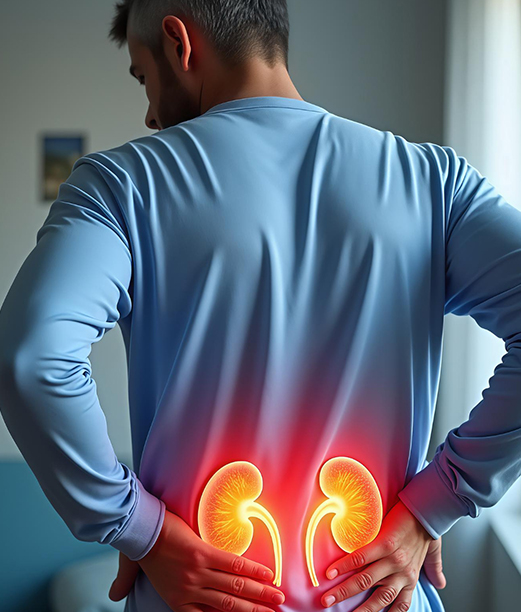- 8595599326, 9999908484
- yugrishiayurveda@gmail.com
- Mon - Sat: 9:00am - 6:00pm Sunday Off
The kidneys play a vital role in maintaining overall health. Their primary function is to filter waste products, excess water, and other impurities from the blood. These toxins are then stored in the bladder and expelled through urination. In addition to filtering, the kidneys help regulate the body’s pH balance, as well as the levels of salt and potassium. They also produce hormones that control blood pressure and stimulate the production of red blood cells. Furthermore, the kidneys activate a form of vitamin D that aids in the absorption of calcium, supporting bone health.

Most kidney diseases primarily affect the nephrons, which are the functional units of the kidneys. When these nephrons are damaged, the kidneys may become less effective at removing waste products from the body. Causes of kidney damage can include genetic conditions, injuries, or certain medications. Individuals with diabetes, high blood pressure, or a family history of kidney disease are at an increased risk. Chronic kidney disease, for example, causes gradual damage to the nephrons over a span of several years. Other conditions that can affect kidney health include:
Cancer
Cysts
Kidney stones
Infections
Common symptoms of kidney dysfunction or disease may include:
Fatigue
Difficulty concentrating
Trouble sleeping
Poor appetite
Muscle cramping
Swelling in the feet and ankles
Puffiness around the eyes, especially in the morning
Dry, scaly skin
Frequent urination, particularly at night
These signs may indicate that the kidneys are not functioning optimally and should be assessed by a healthcare professional.
Chronic kidney disease (CKD) is the most common form of kidney disease, and it is a long-term condition that progressively worsens over time. One of the primary causes of CKD is high blood pressure. High blood pressure is harmful to the kidneys because it increases pressure on the glomeruli, the tiny blood vessels in the kidneys responsible for filtering the blood. Over time, this increased pressure damages these vessels, leading to a decline in kidney function. As kidney function deteriorates, the kidneys are no longer able to effectively perform their job, and the individual may eventually require dialysis, a procedure that filters excess fluid and waste from the blood. While dialysis can help manage kidney disease, it does not cure it. In some cases, a kidney transplant may be a viable treatment option.
Diabetes is another major cause of chronic kidney disease. High blood sugar levels from diabetes damage the blood vessels in the kidneys over time, impairing their ability to filter the blood properly. If left untreated, this can lead to kidney failure, where the body becomes overloaded with toxins.
In Ayurveda, chronic kidney failure (CRF) is seen as a disease of the Mutravaha Srotas (the channels responsible for urine and excretion). While all three doshas—Vata, Pitta, and Kapha—along with the body’s tissues (Dushyas) are involved in the disease process, Kapha is thought to contribute to the blocking of microvessels and the development of microangiopathy. Vata, on the other hand, is responsible for the degeneration of kidney structure.
Ayurvedic management of CKD focuses on preventing and repairing tissue damage using Rasayana (rejuvenating) herbs, which improve tissue quality and enhance resistance. Additionally, Lekhana (scraping) herbs are used to clear blockages in the channels, promoting better circulation and kidney function.
Kidney stones are a common issue that arise when minerals and other substances in the blood crystallize within the kidneys, forming solid masses or stones. While kidney stones usually pass out of the body through urination, the process can be extremely painful. However, in most cases, kidney stones do not cause significant long-term problems.
In Ayurveda, kidney stones are referred to as Ashmari. The term Ashmari is derived from two Sanskrit words—Ashma (stone) and Ari (enemy), highlighting the stones as an unwelcome obstruction. When there is an imbalance in Vata dosha, it can lead to dryness in the body’s Kapha composition, which may contribute to the formation of kidney stones.
Ayurvedic treatment for kidney stones takes a holistic approach, aiming to address the root cause of the imbalance in the body and promoting the dissolution and elimination of the stones. This approach focuses on balancing the doshas and utilizing natural remedies to improve kidney health and prevent further stone formation.
Painful urination, or dysuria, can indicate a range of issues, including infections, kidney or bladder stones (calculi), or irritation due to allergies or other factors. In men with enlarged prostates, urinary obstruction can lead to candida infections. In women, painful urination may result from urinary tract infections (UTIs) or irritation of the labia majora, particularly postpartum. Additionally, if urine becomes ‘sweet’ or stagnates for too long, it can promote bacterial overgrowth. Dysuria can also be caused by sensitivity to potassium, which may trigger spasms in the urinary muscles.
Cystitis is the inflammation of the urinary bladder or urinary tract, typically caused by a bacterial infection. The bacteria responsible often originate from the rectum, colon, and vagina, and they invade the urinary tract, leading to infection and inflammation. In Ayurveda, cystitis is referred to as Mootrakrichha. The function of urine elimination is governed by Apana Vayu. When Apana Vayu becomes vitiated due to factors such as consuming dry foods, excessive alcohol, overexertion, overeating, or indigestion, it can disrupt normal urination and lead to Mootrakrichha.